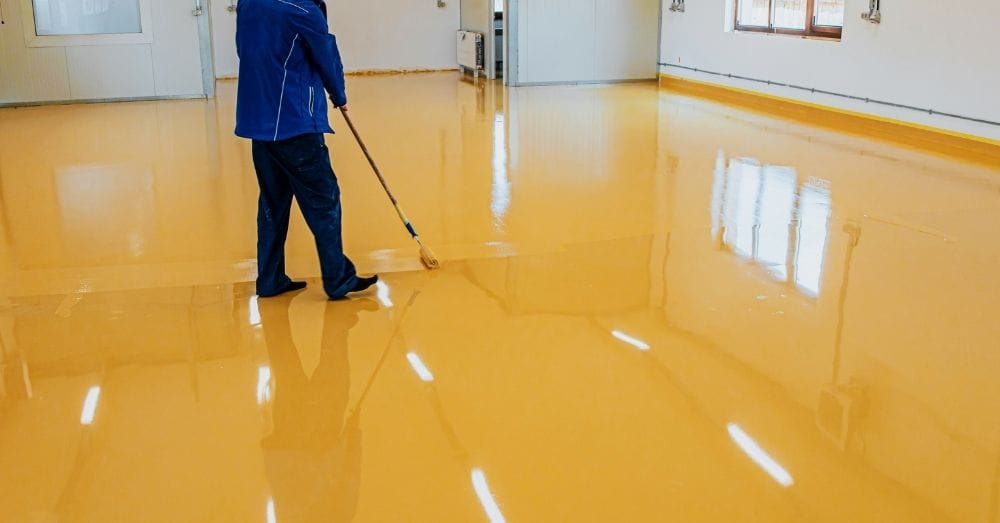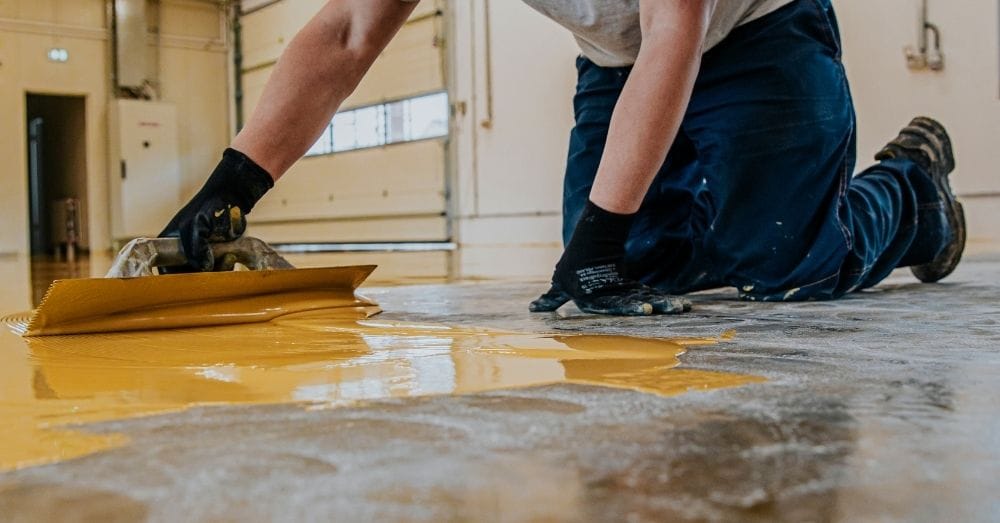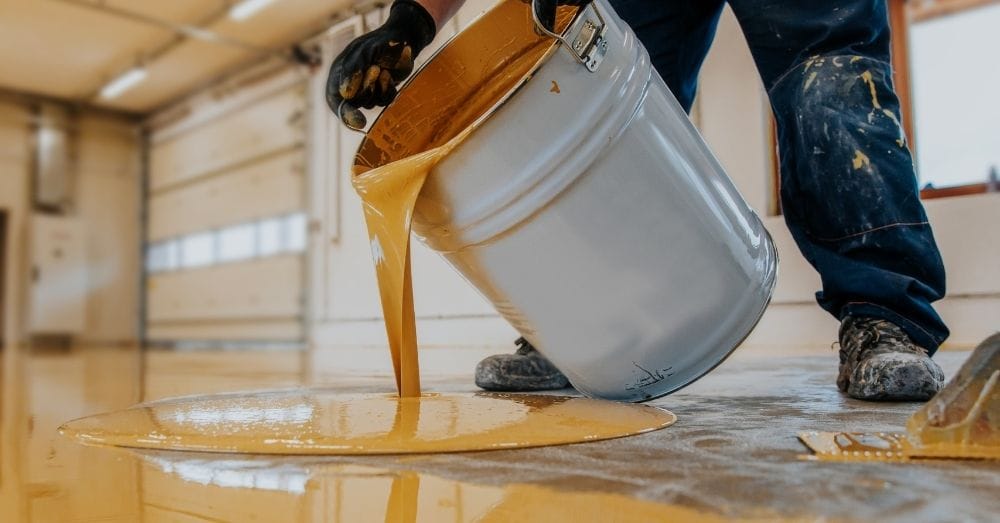
Thinking About Epoxy Garage Floors? Here’s What to Expect from the Installation Process
Epoxy garage floor coatings are becoming an increasingly popular choice for homeowners and business owners alike. As the global flooring market size is projected to grow to USD 676.26 billion by 2033, epoxy coatings are playing a significant role in this expansion.
Epoxy coatings provide a long-lasting, protective layer that can withstand heavy traffic, spills, and harsh conditions. The process of coating garage floors with epoxy may seem daunting, but understanding what’s involved can make it easier to navigate.
Here are six essential things to expect when installing a new garage floor coating.
Table of Contents
Key Takeaways
✔ Epoxy garage floor coatings offer durability and a glossy finish, making them ideal for both residential and commercial spaces.
✔ Proper surface preparation is crucial for ensuring the epoxy adheres correctly and lasts longer.
✔ Different epoxy formulations are available depending on traffic volume and the intended use of the space.
✔ Professional installers ensure the epoxy coating is applied under the right conditions for a flawless finish.
✔ The curing process for epoxy takes 24 to 48 hours, depending on temperature and humidity levels.
✔ Epoxy coatings come in various colors and finishes, allowing for customization to suit any style.
✔ Commercial epoxy coatings are designed to withstand higher foot traffic and heavy machinery use.
✔ Regular cleaning and maintenance help preserve the appearance and longevity of the coating garage floor.

6 Key Steps in the Epoxy Garage Floor Coating Installation Process
1. Preparing the Garage Floor
The first and most crucial step in the installation of epoxy garage floor coating is preparing the surface. This involves clearing the garage floor of all debris, dirt, and oil stains to ensure the epoxy bonds correctly. Properly prepping the surface is essential for a long-lasting coating garage floor covering epoxy that won’t peel or crack prematurely.
2. Cleaning and Repairing the Surface
Once the floor is cleared, it’s important to thoroughly clean and repair any cracks or chips. A clean surface allows the new garage floor coating to adhere effectively, while filling in imperfections ensures a smooth, even finish. If left untreated, surface damage can lead to problems with the coating, reducing its durability and performance over time.
3. Applying the Primer
After the floor is cleaned and repaired, the next step is to apply a primer to help the epoxy coating bond better with the surface. The primer acts as a base layer, allowing the epoxy to set securely, especially on porous concrete. A commercial epoxy garage floor coating may require a more specialized primer depending on the level of foot traffic and the nature of the space.
4. Coating the Garage Floor
With the primer in place, the actual epoxy application begins. The epoxy resin and hardener are mixed and spread evenly across the surface using rollers or brushes, ensuring full coverage. This is when the garage floor covering epoxy begins to take shape, transforming a dull concrete floor into a glossy, durable surface.
5. Allowing Curing and Drying Time
Once the epoxy is applied, it’s essential to allow sufficient time for curing and drying. The epoxy needs to set properly to ensure maximum hardness and durability, typically taking anywhere from 24 to 48 hours. Rushing this process can result in an uneven finish, so it’s important to be patient before using the garage floor.
6. Post-Installation Care and Maintenance
After the garage floor covering epoxy is fully cured, maintenance is key to preserving its look and durability. Regular cleaning with mild soap and water helps maintain its shine and keeps stains at bay. Avoid using harsh chemicals that could degrade the finish and shorten the lifespan of the coating, ensuring that the new garage floor coating stays looking fresh for years to come.
How to Choose the Right Epoxy Coating for Your Garage
The global epoxy coating market size is projected to grow to USD 63.89 billion by 2032, highlighting the increasing demand for durable, high-performance coatings. However, choosing the right epoxy coating for a garage floor can be a challenge due to the variety of options available, but it’s essential to select one that meets specific needs based on garage type, usage, and desired aesthetic.
Here are six important aspects to consider when coating garage floors:
1. Residential vs. Commercial Epoxy Garage Floor Coating
Residential garages typically require a standard epoxy, while commercial spaces need a more durable, industrial-grade product. Professionals can help select the right epoxy for the specific demands of the garage, ensuring long-lasting durability.
2. Traffic Volume and Wear Resistance
Garages with minimal foot traffic can use a standard commercial epoxy garage floor coating, but high-traffic areas need an abrasion-resistant option. Professionals can determine which coating is best suited for the traffic volume the garage will endure.
3. Durability and Long-Term Protection
Epoxy coatings vary in strength and durability, with some formulations offering better chemical resistance. Professionals can help choose a coating that provides long-term protection against chemicals, oil spills, and heavy usage.
4. Aesthetic and Finish Options
Epoxy coatings come in various colors, textures, and finishes, allowing customization for any space. Professionals can recommend a finish that enhances the garage’s appearance while meeting its functional needs.
5. Curing Time and Application Conditions
Some epoxy coatings require specific curing conditions to prevent bubbling or poor adhesion. A professional installer ensures that the coating is applied under the right conditions for a smooth and durable finish.
6. Budget and Cost Considerations
Epoxy coating costs vary based on the type and application method, with commercial coatings being more expensive but offering longer durability. Working with a professional ensures the best balance between quality and budget.

Frequently Asked Questions (FAQs)
How do I know if my garage floor is suitable for epoxy coating?
Ensure the floor is clean, free of cracks, and properly prepared for proper adhesion. Professional help can repair any significant damage and prepare the surface.
Can I apply epoxy garage floor coating over old paint or other coatings?
Old paint or coatings must be properly sanded or stripped for a strong bond. Professionals can assess and determine if the existing coating needs removal.
How long does it take for an epoxy-coated garage floor to fully cure?
Epoxy typically takes 24 to 48 hours to cure, depending on temperature and humidity. Avoid using the garage during this time to ensure proper curing.
Can epoxy coatings be applied to other floors besides garage floors?
Epoxy coatings are versatile and can be applied to basements, driveways, and commercial floors. Consult professionals for the best solutions for different floor types.
Are there any environmental concerns with epoxy garage floor coatings?
Epoxy coatings release fumes during application and curing, requiring proper ventilation. Professionals ensure safe application and minimize environmental risks.
Transform Your Space with Carmel Flooring Company’s Expert Services
At Carmel Flooring Company, we specialize in providing high-quality flooring solutions that elevate any room in your home or business. Whether you’re looking for a fresh new epoxy garage floor coating, stylish hardwood floors, or durable tile options, our team is here to guide you every step of the way. With years of experience serving Carmel, NY, we pride ourselves on exceptional customer service, precision installation, and unmatched expertise.
Ready to upgrade your floors? Contact Carmel Flooring Company today for a free consultation.
